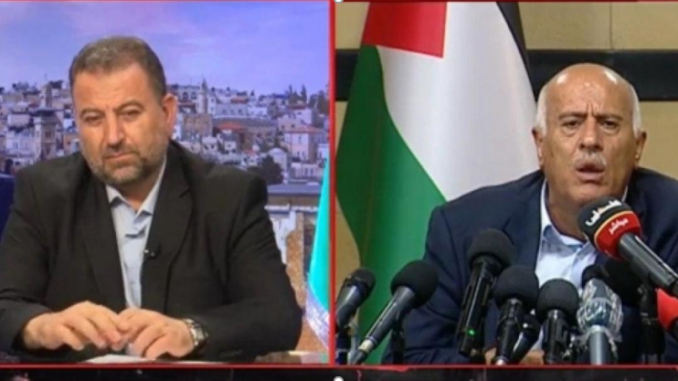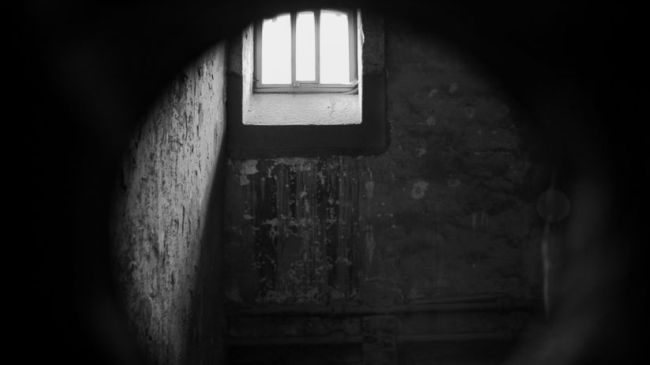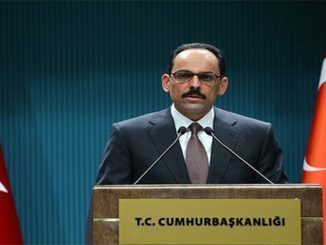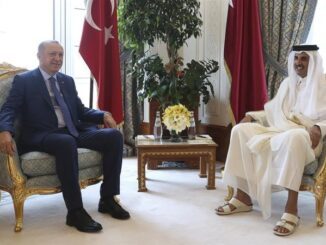
A rare joint conference with Fatah’s Jibril al-Rajoub and Hamas’s Saleh al-Arouri was the first major joint media appearance for the two Palestinian parties since 2017.
A joint video conference between the two biggest Palestinian political factions of Fatah and Hamas was held on Thursday to show Palestinian unity against Israel’s annexation plan of parts of the occupied West Bank marked a rare public event between the two rival groups.
Jibril al-Rajoub, the head of Fatah’s central committee, and Saleh al-Arouri, the deputy head of Hamas’s politburo, spoke during a conference broadcast on Palestine TV.
Arouri described the conference as a “gesture towards unity”.
“If the [Israeli] occupation was able to pass the annexation of part of the West Bank, that means a series of annexations will continue,” he said.
Rajoub confirmed that Fatah, the ruling party of the West Bank-based Palestinian Authority (PA), was working alongside Hamas, the de facto ruling party in the besieged Gaza Strip, to tackle US President Donald Trump’s so-called “deal of the century”, widely viewed by Palestinians as having paved the way for Israel to push forward its annexation plans that were initially scheduled to be unveiled on Wednesday.
“We are 100 percent in harmony with Hamas to face the challenge that threatens our cause,” Rajoub said. “Today, we are coming out with one voice and one flag, and we are working on building a strategic vision to face challenges and lead the public with the participation of all factions.”
Following Hamas’s victory in 2006 legislative elections, Fatah and Hamas confronted each other in a brief armed conflict in which the PA was effectively booted out of power in the Gaza Strip.
Since then, the PA and Hamas have failed to resolve their acrimonious power struggle, with numerous attempts at forming a unity government falling flat, effectively leaving Gaza under the control of a Hamas-led administration separate from the PA operating in the occupied West Bank.
The last time Fatah and Hamas came together in a major media conference was in October 2017, when they signed a unity deal in Cairo which they said would end the more than decade-long rift between the two parties.
The deal was not implemented and relations between the two movements once again turned sour
Arouri said that both Fatah and Hamas need to freeze all disagreements in order to reach a strategic deal to “address the danger which the Palestinian cause faces”.
“We and Fatah were never in disagreement to face the occupation and its plans… We have to take a true and honest stand to face this project and make it fail,” Arouri said.
Germany efforts to stop annexation plans
In the same context, the German parliament on Wednesday passed a resolution urging the government in Berlin to use its close ties with Israel to prevent Tel Aviv from annexing large swaths of the occupied West Bank.
The non-binding motion was brought in the parliament by the three parties in Chancellor Angela Merkel’s broad coalition and was approved without opposing votes.
The resolution calls for Berlin to use its “special relations and contacts [to Tel Aviv] to express to the Israeli government our concerns and our urgent demand to refrain from the annexation of parts of the West Bank and from the continued expansion of settlements, both of which contradict international law.”
All parliamentary groups, aside from the far-right Alternative for Germany (AfD) party, warned that Israel’s plans to annex parts of the West Bank would jeopardize Israel’s security and hopes of a two-state solution.
“We reject unilateral changes of borders, and we won’t recognise them,” Foreign Minister Heiko Maas said in the parliamentary debate that preceded the vote. “Now it’s about creating space for diplomacy.”
Israel was due to begin annexing settlements in the occupied West Bank yesterday, however, uncertainty surrounds Prime Minister Benjamin Netanyahu’s position in light of widespread international rejection of the plan along with differences with the US administration on its application.
Peace between Israelis and Palestinians “cannot be achieved through unilateral steps but only through serious negotiations,” Maas added.
Maas called on Israel to reconsider such plans, saying it was still possible to use “the opportunity and the time window” before a likely annexation.
The German foreign minister has vowed to put the issue on top of the agenda after it assumed the six-month rotating presidency of the Council of the European Union (EU), as well as chairing the month-long UN Security Council, which means that it will be active in navigating the EU’s response to Israel’s planned annexation.



